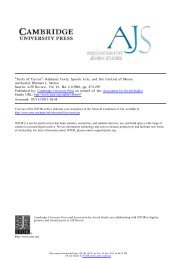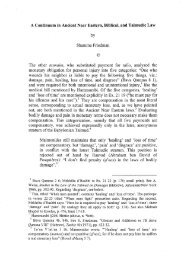Wimpfheimer_ Is it not so.pdf
Wimpfheimer_ Is it not so.pdf
Wimpfheimer_ Is it not so.pdf
Create successful ePaper yourself
Turn your PDF publications into a flip-book with our unique Google optimized e-Paper software.
62 ❙ Barry <strong>Wimpfheimer</strong><br />
Mar⁴¹ bar ¼anina⁴² rented his mule⁴³ to Bei ¼ozai.⁴⁴ [Mar bar<br />
¼anina] went out to lift up a load w<strong>it</strong>h [Bei ¼ozai].⁴⁵ They were negligent<br />
w<strong>it</strong>h <strong>it</strong> and <strong>it</strong> died. When they⁴⁶ came before Rava, he obligated<br />
[Bei ¼ozai] (to pay).⁴⁷ The Rabbis [his disciples] said to Rava:⁴⁸ But <strong>it</strong><br />
is negligence w<strong>it</strong>h the owner [in service]! He was ashamed.<br />
Eventually <strong>it</strong> was ascertained that he had gone forth to examine⁴⁹<br />
<strong>it</strong>s load.<br />
Now, on the view that for negligence w<strong>it</strong>h the owner in service<br />
there is no responsibil<strong>it</strong>y, <strong>it</strong> is well; (for that rea<strong>so</strong>n he was ashamed).⁵⁰<br />
But on the view that one is liable (for negligence in the presence of<br />
an owner),⁵¹ why was he ashamed?<br />
They were <strong>not</strong> negligent w<strong>it</strong>h <strong>it</strong>, but <strong>it</strong> was stolen and <strong>it</strong> died a<br />
natural death in the thief 's house; and they⁵² came before Rava, and he<br />
obligated them.<br />
[Thereupon] the Rabbis said to Rava: But <strong>it</strong> was theft w<strong>it</strong>h the<br />
owner [in service]! He was ashamed.<br />
Eventually <strong>it</strong> was ascertained that he had gone forth to examine <strong>it</strong>s<br />
load.<br />
The passage opens w<strong>it</strong>h the facts of the case: Mar rents a mule to Bei ¼ozai,<br />
and assists them in <strong>it</strong>s loading. Bei ¼ozai's negligence contributes to the animal's<br />
death. The passage proceeds to the judgment: Rava obligates Bei ¼ozai in light of<br />
their negligence. Suddenly, courtroom etiquette is breached.⁵³ ``The Rabbis,'' Rava's<br />
students, interject that Mar had been present when the animal was loaded, and Rava<br />
is ashamed.<br />
According to the trad<strong>it</strong>ional interpretation of this narrative, Rava denies Mar's<br />
presence <strong>it</strong>s unquestionable normative abil<strong>it</strong>y to exonerate Bei ¼ozai. The law is<br />
never in question; Rava's error lies entirely in a judgmental oversight.⁵⁴ This<br />
interpretation is troubling, though, since the case that appears in Rava's courtroom<br />
is far from self-evident. No legal precedent exists for this case of ®rst impression.<br />
Exod. 22:13±14 articulates owner presence as an exonerating exception in a<br />
standard case of loss, <strong>not</strong> one in which the renter is actively responsible for that loss.<br />
Mishnah Bava Metsi¦a 7:9⁵⁵ implies an obligation for all nonowners in standard

















